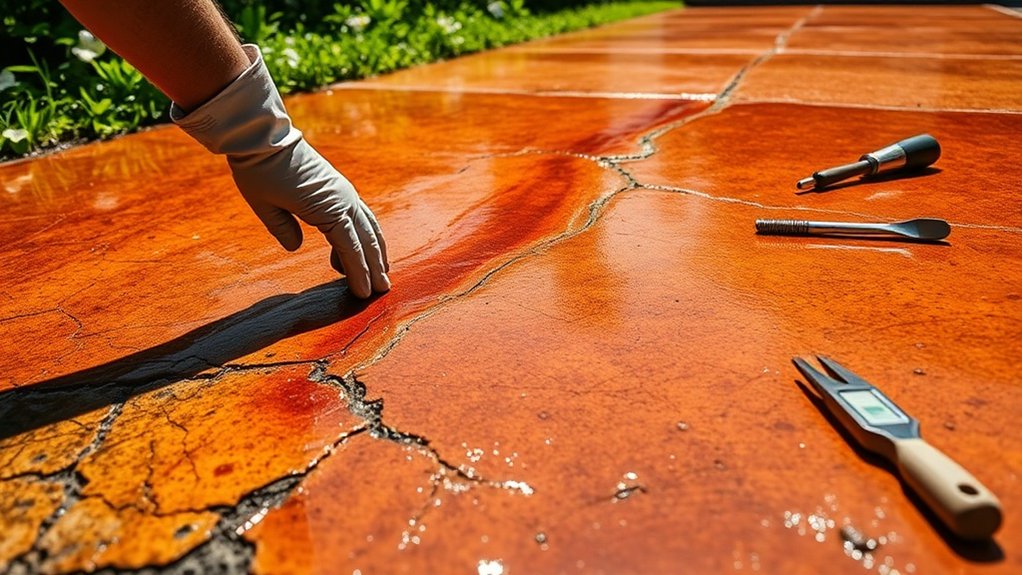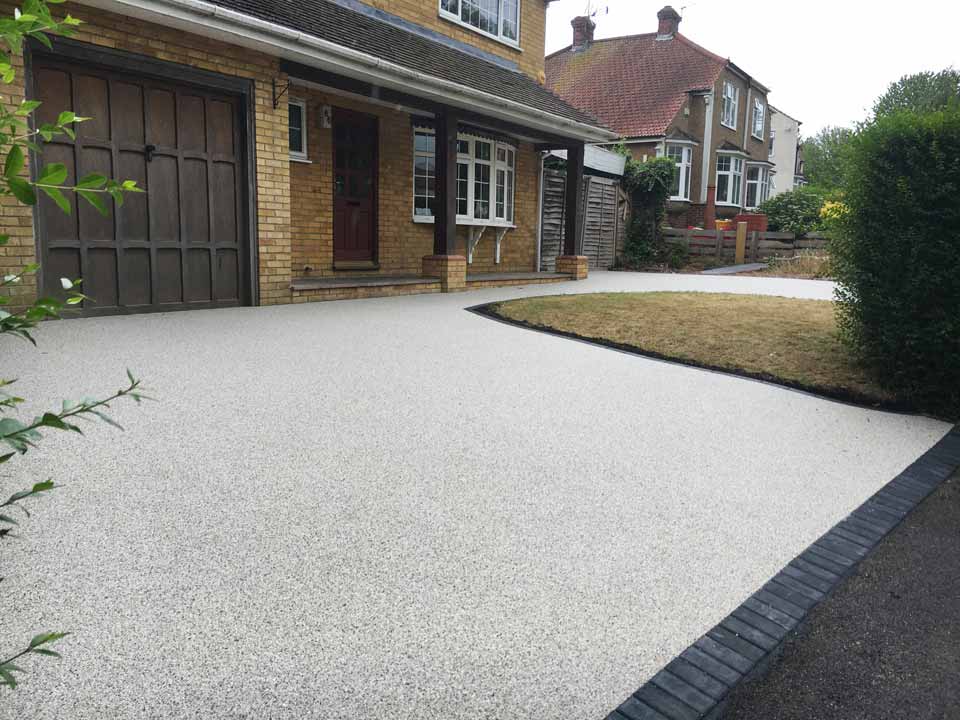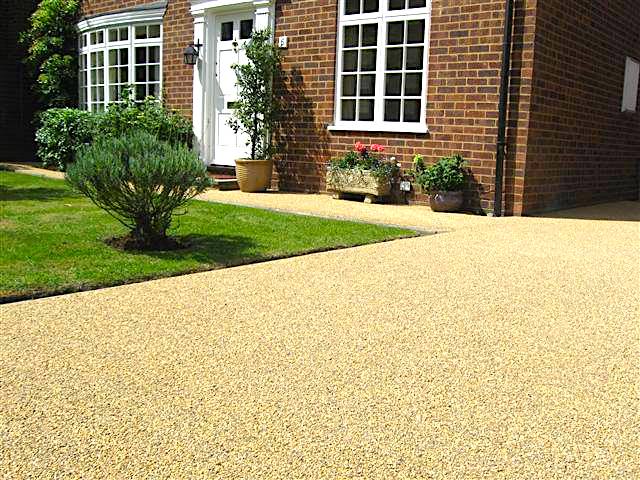Yes, you can resurface an old driveway with resin. It’s a robust option that not only improves the look but also the functionality, providing a seamless finish that’s easy to maintain. First, check your existing driveway for any cracks and ensure it’s stable. Proper preparation is key, so clean and prime the surface thoroughly. With the right materials and professional installation, your driveway can last between 15 to 25 years. Stay tuned to learn more about the benefits and the process involved!
Table of Contents
ToggleKey Takeaways
Yes, you can resurface an old driveway with resin, provided the existing surface is stable, such as old concrete or tarmac. Resin resurfacing effectively tackles issues like peeling and unevenness, while also extending the driveway’s lifespan.
Proper preparation is crucial: repair any cracks and apply a primer for a successful resin application. Resin surfaces are durable and can last between 15 to 25 years with minimal upkeep, making them a cost-effective choice compared to a complete replacement.
For the best results and to properly handle any drainage concerns, it’s advisable to hire a professional for the installation.
Understanding Resin Driveways
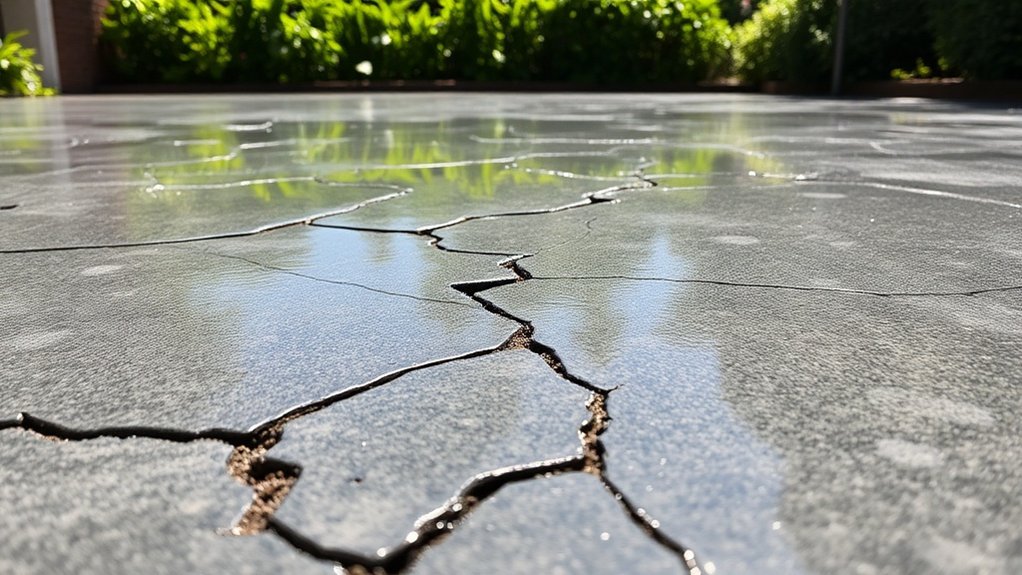
When upgrading your driveway, it’s essential to understand resin driveways to make an informed choice.
Resin driveways come in different types, such as resin-bound and resin-bonded systems, each offering distinct benefits and design options. One of the appealing features is the variety of colours available, allowing you to personalise your driveway to complement your home. Additionally, resin driveways offer durability for outdoor use, ensuring they withstand various weather conditions. The permeable option provided by resin bound paving also helps to manage water drainage effectively, reducing the risk of flooding.
Before applying resin, ensure your existing surface is suitable. Old concrete, tarmac, or asphalt can provide a solid base if properly prepared, which includes cleaning the surface, applying a primer, and checking that the foundation is robust enough for your intended use.
With adequate preparation, a resin driveway can significantly enhance both the appearance and durability of your property.
Benefits of Resurfacing With Resin
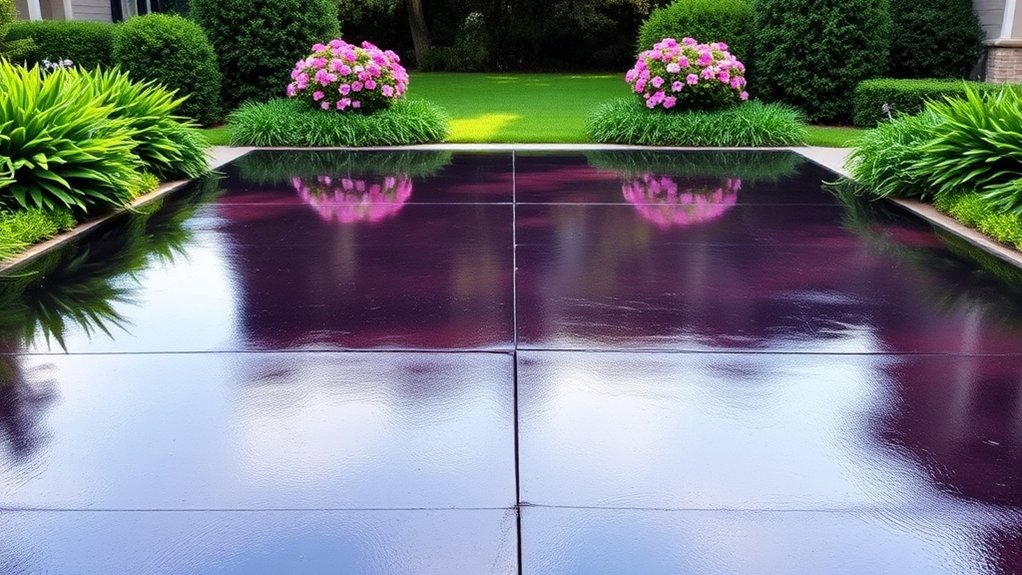
Resurfacing your driveway with resin presents several benefits that make it a worthwhile investment for your home.
Firstly, resin is incredibly durable, capable of withstanding the UK’s varied weather without cracking or fading. This ensures a lifespan of over 20 years with very little maintenance needed. You won’t have to worry about loose stones or the hassle of resealing either. Additionally, the materials used undergo durability testing to ensure long-lasting performance.
Moreover, the seamless surface enhances safety by reducing trip hazards and offers a modern aesthetic with a range of colours and finishes to choose from. The permeable nature of resin also allows for natural drainage, reducing surface water runoff and complying with Sustainable Urban Drainage Systems regulations.
This contemporary look can significantly improve your property’s curb appeal and may even increase its value, making resin driveways a practical and stylish option for homeowners.
Assessing Your Old Driveway
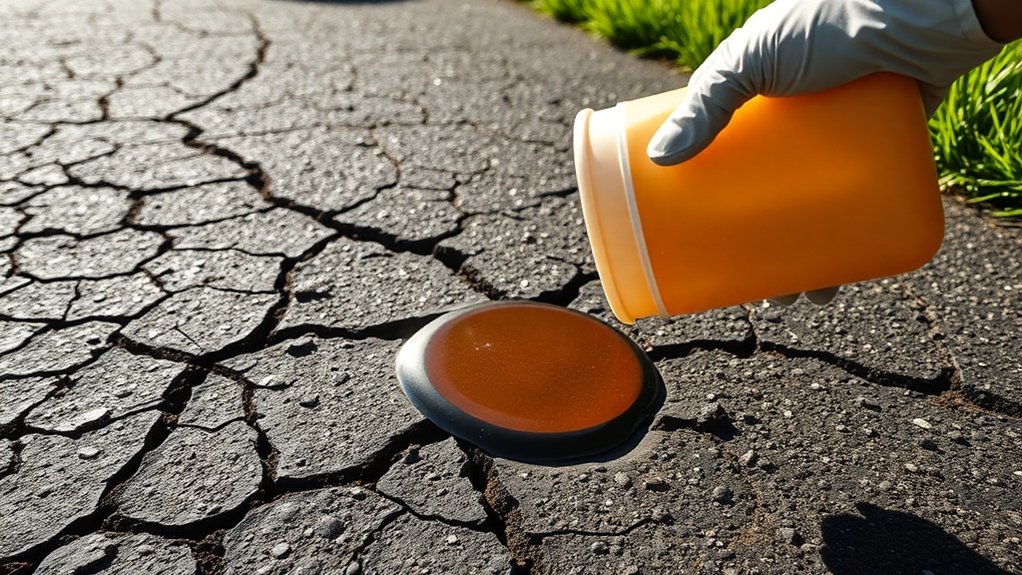
How can you tell if your old driveway is ready for a fresh layer of resin? Start with a thorough evaluation. Look for visible issues such as large cracks, potholes, or surface spalling, which can indicate structural problems. Measure the size of any cracks; hairline cracks can usually be filled, but larger ones may require more extensive repairs. Check the subsurface stability—if the driveway is warped or has poor drainage, there could be deeper issues. Consider the age and maintenance history of your driveway; older driveways or those that haven’t been well-maintained might need more than just resurfacing. Understanding property condition can also help you decide the best course of action for your driveway. Lastly, ensure safety by identifying any uneven surfaces or hazards that could pose risks. This assessment will help you decide the best course of action for your driveway. Additionally, addressing crack types early on can prevent further deterioration and ensure a smoother resurfacing process.
Surface Preparation Steps
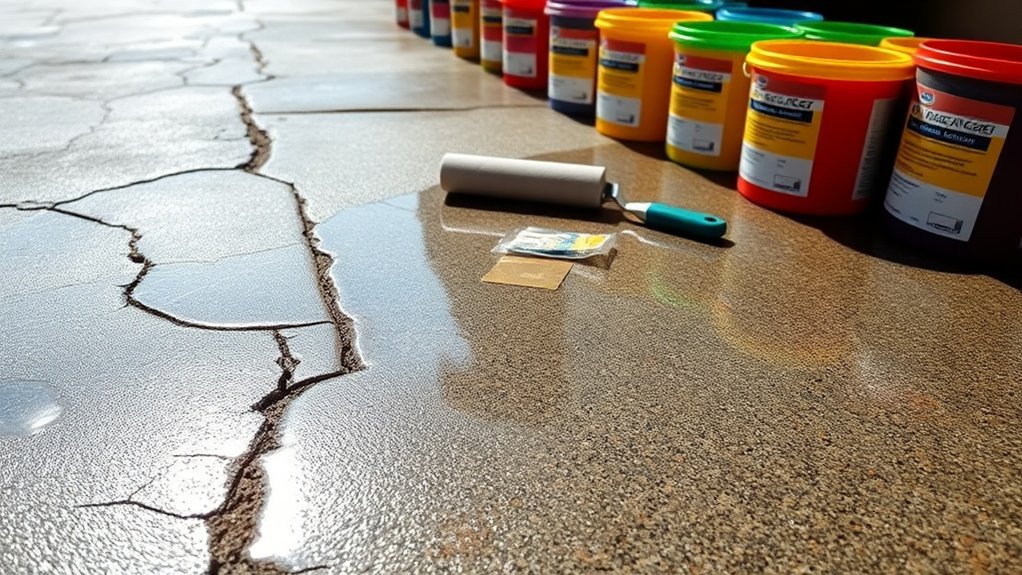
Once you’ve assessed your old driveway, it’s time to prepare it for a new layer of resin. Start with a thorough inspection to spot any cracks or holes that need fixing.
For larger cracks or structural damage, consider using effective repair methods or consulting a professional. Remove any loose or crumbling materials to ensure the area is stable.
After repairs, sand or grind the surface to achieve a smooth finish. Next, apply a suitable primer evenly to improve adhesion and prevent delamination.
Be sure to allow everything to cure fully before proceeding. These preparation steps are crucial for a durable and attractive resin surface that will last.
Cleaning the Existing Surface
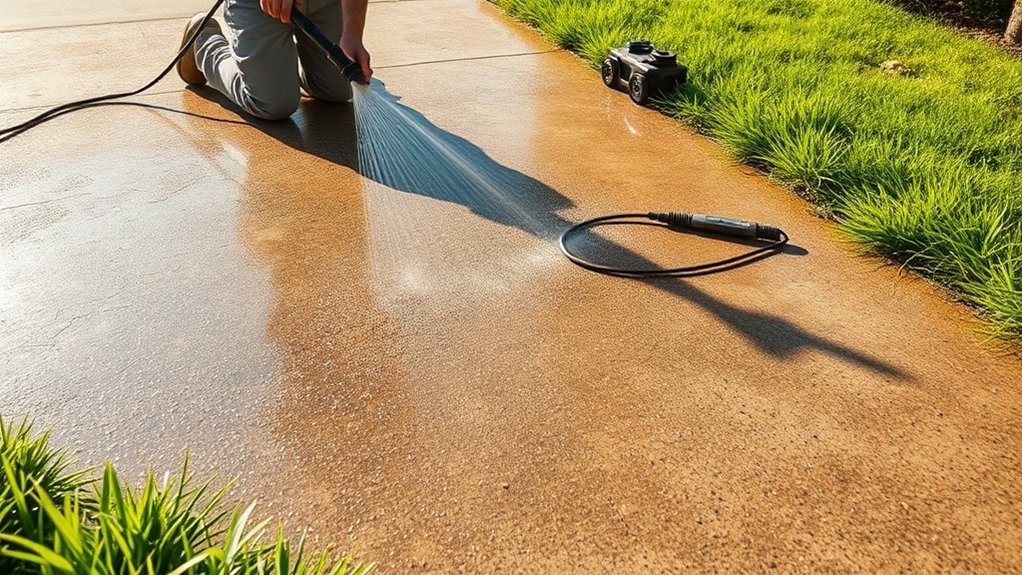
Before applying a new layer of resin, it’s crucial to clean the existing surface properly to ensure good adhesion and durability.
Start by sweeping weekly to remove dirt, leaves, and stones that might get trapped in the resin. Use a stiff brush for stubborn debris to maintain both traction and appearance.
After sweeping, rinse the surface with moderate water pressure—be careful not to flood it, as that can cause puddles.
For cleaning, use mild, pH-neutral detergents to break down grime without damaging the resin.
For particularly tough stains, a gentle jet wash or warm, soapy water will do the trick.
Lastly, address any moss or algae growth by treating affected areas and always rinse thoroughly after using any chemicals.
Patching Holes and Potholes
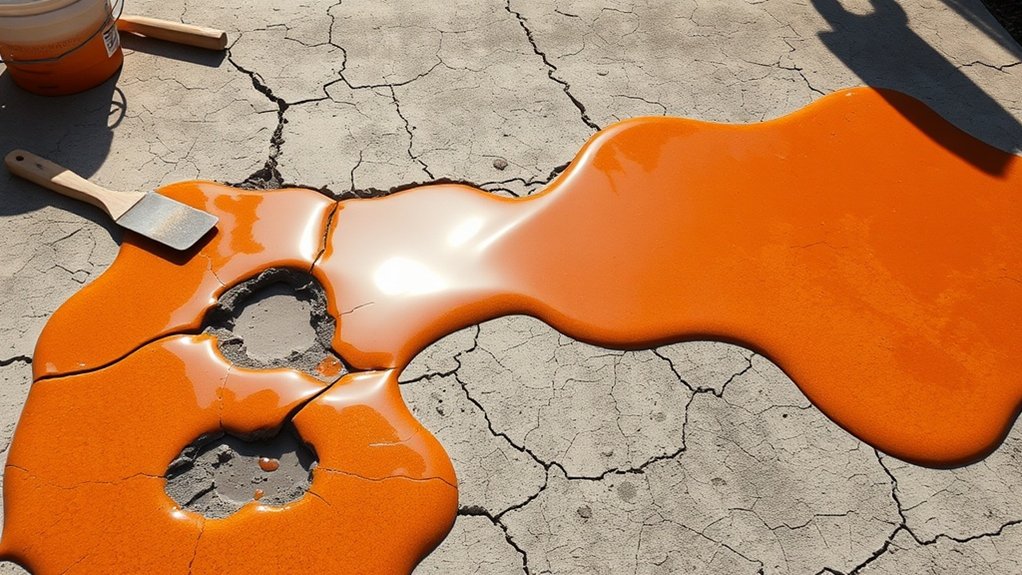
Potholes and cracks can be a major headache for any driveway, but tackling them quickly can prevent more costly repairs later on. Start by giving the area a good clean to remove any debris before you begin repairs. For small cracks under 5mm, a resin crack filling kit will do the trick. Larger potholes may require a new layer of resin, which is best handled by a professional.
| Repair Type | Recommended Material |
|---|---|
| Small Cracks | Resin Crack Repair Kit |
| Large Potholes | Resin and Aggregate Mix |
| Tarmac Driveways | Cold-lay Tarmac Repair Product |
Make sure the repair material bonds well with the existing surface, and allow the repairs to fully cure before using the driveway again.
Application Process for Resin
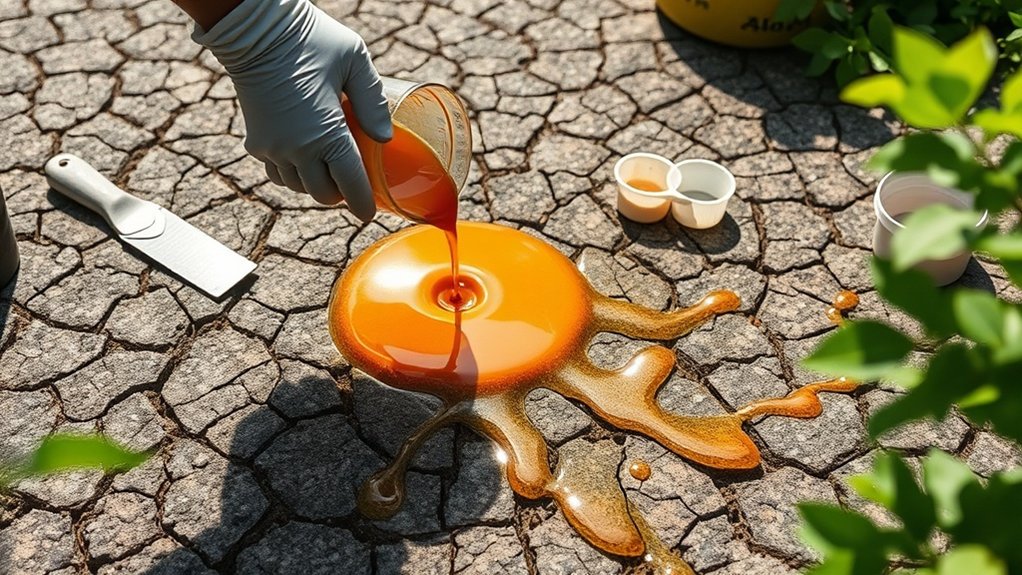
Once you’ve filled those annoying holes and cracks, you’re set to apply the resin for a smooth, durable finish.
First, ensure your surface is clean and primed to improve adhesion. Use a forced-action mixer to blend your chosen resin types with aggregates, following the manufacturer’s recommendations.
Pour the mixture onto the prepared base within 10-15 minutes, using tools like a squeegee or trowel to spread it evenly. Level the surface with a plasterer’s float, making sure to eliminate any air pockets.
Keep edge protection tape in place until the resin is fully cured to avoid any bleed. Work efficiently but carefully to achieve a consistent finish that will last for years.
Curing Times and Temperature Considerations
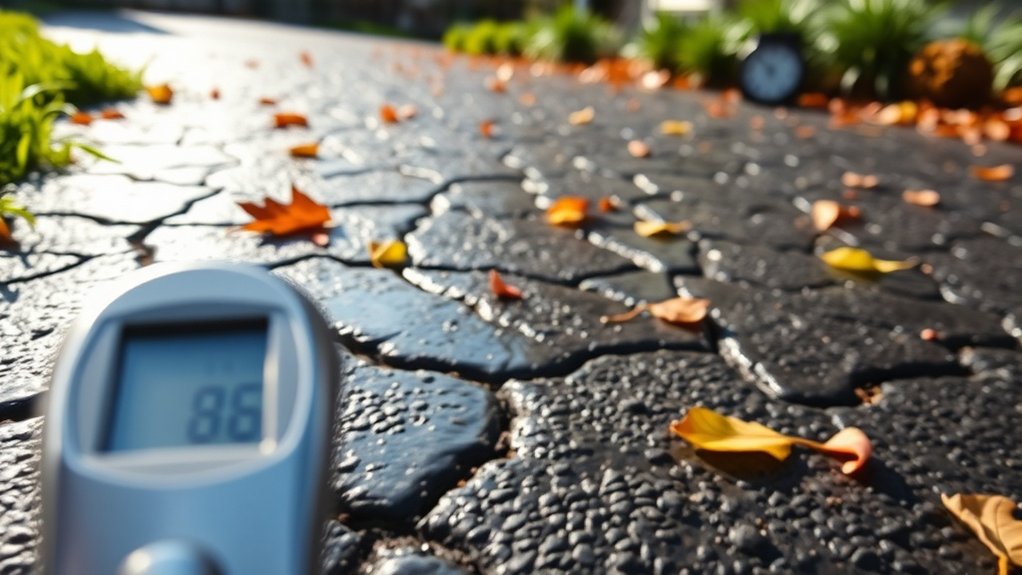
When resurfacing your driveway with resin, it’s crucial to consider curing times and temperature.
In summer, warmer conditions can accelerate curing, while in winter, cooler temperatures may necessitate the use of accelerators to ensure proper hardening.
Monitoring humidity and temperature is key to achieving the best results for your driveway.
For instance, if you’re working in a particularly damp area, be mindful that excessive moisture can affect the curing process.
Summer vs. Winter Curing
When curing resin for driveway resurfacing, the season significantly impacts both the quality and speed of the process.
Summer is the best time for curing, with temperatures between 20°C and 25°C allowing for quick initial foot traffic in just 6 to 12 hours, and full curing within 24 to 48 hours. However, be cautious of excessive heat above 30°C as it can cause brittleness, so proper timing is essential.
In winter, the situation changes. When temperatures drop below 5°C, the curing process slows dramatically.
Additionally, moisture from frost or rain can compromise quality, making it crucial to keep a close eye on the weather. Although winter installations might come with cost savings, they require meticulous planning to ensure a durable and well-cured driveway.
Temperature Impact on Curing
Understanding how temperature affects curing is crucial for a lasting resin driveway. The ideal temperature for application is between 5°C and 25°C.
Cold weather below 5°C can slow curing, while heat over 25°C can cause uneven surfaces. High humidity, above 85%, may also lead to delays and issues like foaming.
It’s best to work in stable conditions, particularly in the morning or during late spring to early autumn, when temperatures are most suitable.
Keep an eye on the surface temperature, as overheating during mixing can impact your results.
Accelerator Usage Guidelines
To ensure your resin driveway cures correctly, using an accelerator is essential, particularly in cooler temperatures.
Accelerators, or catalysts, help maintain normal curing speeds when temperatures fall below 15°C.
When mixing, add the accelerator to Part A before incorporating Part B; this ensures a uniform mixture for optimal curing.
Adjust the dosage based on temperature: use 3–5 ml for 5–10°C, 2–3 ml for 10–15°C, and 1–2 ml for 15–20°C.
Always mix thoroughly for at least 60 seconds after adding the accelerator.
Using the correct amount is crucial; too much can compromise the resin’s quality.
Durability and Maintenance of Resin Surfaces
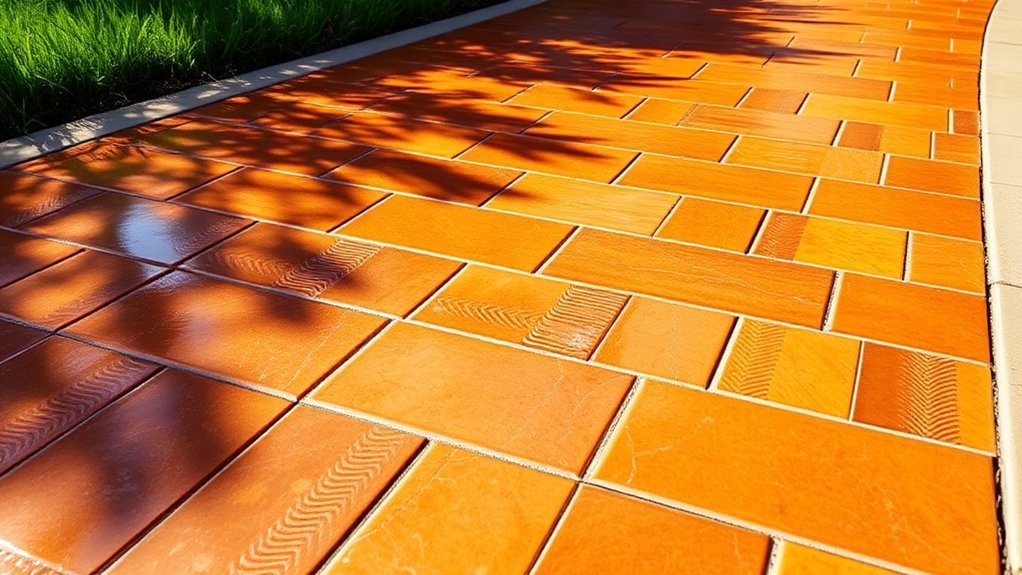
Opting for a resin surface for your driveway means you’re choosing a robust solution that can last between 15 to 25 years with the right care.
Maintenance is straightforward: regular sweeping and the occasional jet wash will keep it looking smart without much effort.
Compared to other materials, resin surfaces require minimal upkeep, allowing you to enjoy a durable, attractive driveway that withstands the British weather.
Long-lasting Performance
When it comes to driveway options, resin surfaces truly excel in durability and low maintenance. With a lifespan of 20 to 25 years, and even up to 30 years with quality materials and proper care, resin driveways offer lasting aesthetics and are environmentally friendly. Their flexibility helps to accommodate ground movement, which reduces the risk of cracks, while UV stability ensures they won’t fade over time.
| Feature | Resin Bound Driveways | Traditional Options |
|---|---|---|
| Lifespan | 20-30 years | 10-15 years (tarmac) |
| Maintenance Costs | Up to 50% lower | Higher |
| Weather Resistance | Excellent | Moderate |
| Flexibility | High | Low |
| Environmental Impact | Permeable design | Non-permeable |
Choosing a resin driveway means investing in a long-lasting, attractive surface that’s also better for the environment.
Easy Maintenance Routine
Caring for your resin driveway is straightforward and doesn’t require much effort. Follow this simple maintenance checklist to keep it looking its best all year round:
- Sweep it weekly with a stiff broom to clear away leaves and debris.
- Wash it monthly with warm, soapy water for a fresh appearance.
- Regularly check for cracks or loose stones to catch issues early.
- Make seasonal adjustments, such as applying UV-resistant sealants in summer.
Using the right tools, like plastic shovels and low-pressure sprayers, can make maintenance easier.
In winter, use non-corrosive de-icing agents to protect your resin.
Cost Implications of Resin Resurfacing
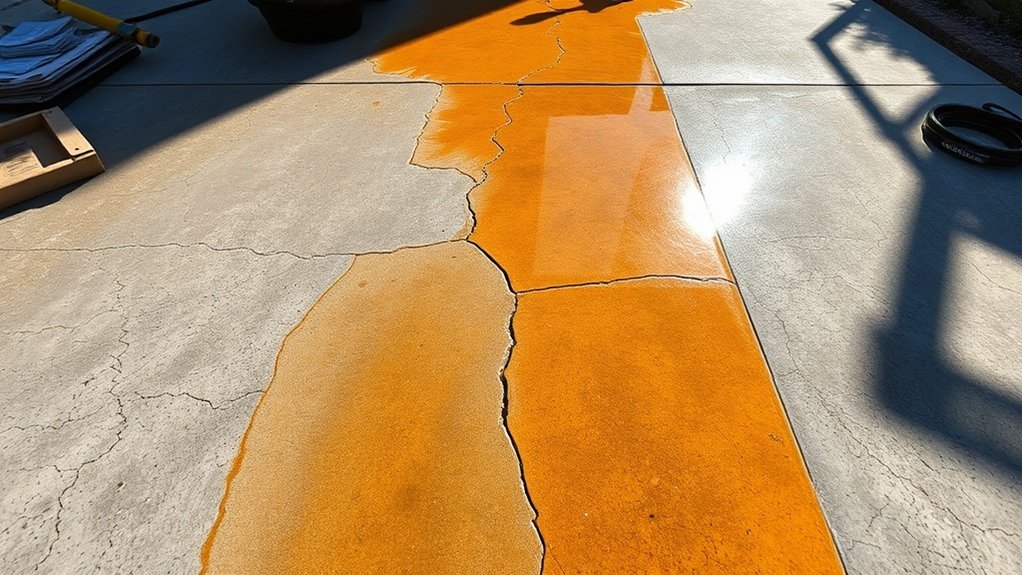
When considering resurfacing your driveway with resin, it’s important to understand the costs involved. Resin typically ranges from £11 to £17 per square foot, including installation.
The quality of the material is crucial, with resin prices between £6.67 and £10.06 per square foot. Installation labour can make up 30% to 50% of your total costs.
Resin resurfacing is generally more expensive than standard concrete overlays but offers greater colour options and enhanced durability.
Remember to account for additional expenses such as resealing every 2 to 4 years, site preparation, and any decorative features you might want.
Always consider the size and complexity of your driveway when estimating the final cost.
Importance of Professional Installation
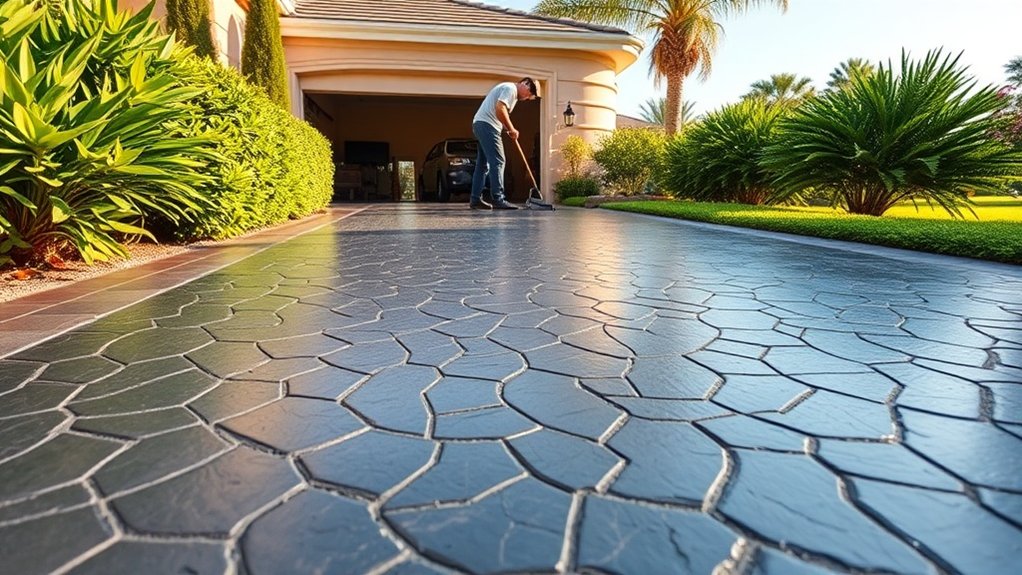
When resurfacing your driveway with resin, opting for professional installation is crucial for achieving optimal results.
Experts ensure the surface is properly prepared, using high-quality materials and effective application techniques that improve adhesion and durability.
For instance, they can avoid common pitfalls like uneven surfaces or poor drainage, which might otherwise lead to costly repairs later on.
Choosing professionals means peace of mind and a finish that lasts.
Expertise in Surface Preparation
Proper surface preparation is crucial for successfully resurfacing your driveway with resin. Poor techniques can lead to expensive issues down the line.
Hiring professionals who specialise in surface preparation and have the right equipment ensures the best outcome. Here are the key steps they follow:
- Thorough cleaning: Removing dirt, oil, and debris to start with a clean surface.
- Crack repairs: Filling in any damage to create a solid foundation.
- Surface profiling: Grinding the surface to create texture, which helps the resin adhere better.
- Bonding agents: Using appropriate agents to enhance the bond between the surface and resin.
Quality of Materials Used
Selecting high-quality materials is crucial for a successful driveway resurfacing project. Using UV-stable polyurethane resin helps prevent discolouration and cracking, even with temperature fluctuations.
It’s vital to source your resin and aggregates from trusted suppliers to ensure durability and longevity. When choosing aggregates, opt for clean, well-distributed natural stone for strong bonding and consistent wear.
Low-quality aggregates can result in loose stones and surface failure, while inferior resins may soften or fade.
Professional installation is also important, as skilled contractors ensure proper mixing ratios and surface preparation, maximising your driveway’s lifespan.
Efficient Application Techniques
Efficient application techniques are crucial for a durable and visually appealing resin driveway. Hiring a professional ensures the entire process is expertly managed, from preparation to finish.
Here are some key techniques they use:
- Pressure washing removes dirt and debris, ensuring proper resin adhesion.
- Careful mixing of resin and aggregate guarantees consistent strength and appearance.
- Trowelling and power-floating create a smooth, polished surface.
- Sealers are applied after curing to improve UV resistance.
Professionals also consider environmental factors that can affect curing quality, minimising the risk of common DIY mistakes.
Their expertise results in a long-lasting, attractive driveway that adheres to manufacturer guidelines, giving you confidence in your investment.
Common Issues Addressed During Resurfacing
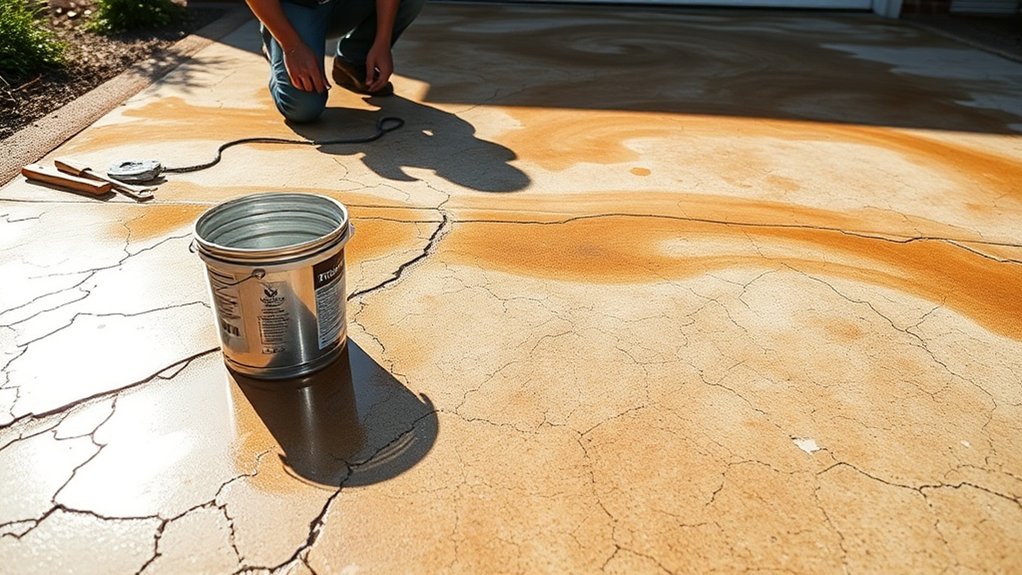
When resurfacing a driveway, it’s crucial to address common issues to ensure a durable and stable surface.
Start with cracks, as they can let water in, worsening the damage. Using sealing and resurfacing techniques can prevent these minor problems from escalating.
Potholes and surface holes are safety hazards; while filling them may be a quick fix, extensive damage often necessitates full resurfacing.
Raveling and loss of aggregate can create uneven surfaces, but resurfacing can rectify this.
Don’t overlook drainage issues, as they can weaken your driveway if not resolved.
Frequently Asked Questions
Can Resin Be Applied Over Asphalt Surfaces?
Yes, you can apply resin over asphalt surfaces. However, it’s crucial to prepare the asphalt properly. Ensure you clean it thoroughly and create a smooth base for the resin to adhere effectively. This will help achieve a durable finish that looks great.
How Long Does the Resin Last After Installation?
Resin driveways generally last between 15 to 25 years, depending on the quality of installation and ongoing maintenance. With proper care, such as regular cleaning and avoiding heavy traffic, you can boost the durability and potentially extend the lifespan beyond 25 years. This ensures a long-lasting and visually appealing surface for your property.
Is Resin Suitable for Hot Climates?
Yes, resin is heat-resistant and durable, making it a good choice for hot climates. Opting for the right formulations and lighter colours can help keep your driveway looking good while reducing heat absorption, ensuring it remains functional and appealing even in high temperatures.
Can I Apply Resin Myself Without Professional Help?
Yes, you can apply resin yourself without professional help! Just follow the installation tips closely, prepare your surface properly, and mix your materials as instructed. With a bit of patience and effort, you’ll achieve a beautiful finish that enhances your space. For example, if you’re working on a table top, make sure it’s clean and level before you start.
What Colors Are Available for Resin Driveways?
You have a range of colour options for resin driveways that can enhance your home’s appearance. Popular choices include sleek greys like Silver Beach, warm tones such as Golden Quartz, and bold shades like Merlot. Each option offers a unique look, allowing you to select what best suits your style.
Conclusion
Resurfacing your old driveway with resin can turn it into an attractive feature that’s remarkably durable. With the right preparation and professional installation, you’ll have a low-maintenance surface that boosts your home’s curb appeal. A worn-out driveway can decrease your property’s value, so consider resin resurfacing to give your entrance a much-needed upgrade. Your driveway will look great, and your visitors will notice the difference!
Whilst it is true that there are certain conditions required in order to lay a resin bound stone patio, pathway Read more
If your driveway is looking old and tired, a new one can help revamp your property. Modern driveways are available Read more
APPROVED RESIN BOUND DRIVEWAY INSTALLERS LOCAL TO YOU! Find out More Get in Touch Get a Free Quote Book an Read more

